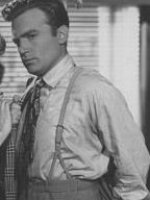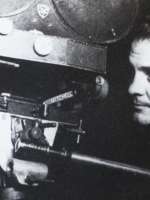Hilda Bernard est une Actrice Argentine née le 29 octobre 1920 à Puerto Deseado (Argentine)

Hilda Bernard, née le 29 octobre 1920 à Puerto Deseado dans la province de Santa Cruz, est une actrice de cinéma, de télévision et de théâtre argentine.
Bernard was born in Puerto Deseado, Santa Cruz Province, Argentina. The daughter of an English father and Austrian mother, Hilda had two brothers: Raquel and Jorge, who went on to play professional rugby. After graduating from high school, a young Hilda attended the National Conservatory of Dramatic Art; but she soon decided to leave the school, opting to begin to study acting under the tutelage of such now legendary Argentine playwrights/acting coaches such as late legendary actor and director Antonio Cunill Cabanellas and actress María Rosa Gallo. In 1941, a young Hilda appeared in her first job as a member of the Cervantes National Theater, first as a pastry saleswoman in the play Martín Fierro, also appearing as a 'young lady' directed by Orestes Caviglia or Enrique de Rosas.
In 1942, Bernard entered the world of radio, signing on with the Radio El Mundo network, where she appeared in several serials acting with actors such as Oscar Casco, Eduardo Rudy, and Fernando Siro. Her voice gained further recognition in programs such as No quiero vivir así and Alguien para querer. She first starred in Argentine cinema in 1952, in Don Napy's Mala Gente. In the early years of Argentine television she appeared in Esos que dicen amarse, a production directed by Alberto Migré that gained great media interest and culminated in a national tour promoting the show.
1960's - 1980's
Her extensive career in Argentine television began in earnest in the 1960s, when she appeared in Argentine TV productions such as The Constant Suicides (1961) and Your Favorite Comedy (1965). Her later television work for Alberto Migré included: Women In Prison (1967); Italian Girl Comes To Marry (1969); High Comedy (1971), directed by María Herminia Avellaneda; and Malevo (1972).
She also made a successful transition to theatre productions, among others appearing in Amanda Viale. Years later, in 1976, she appeared in a TV version of the play Love Has A Female Face, which was not as successful as a prior production. After working on several different television networks, she appeared with actress Amelia Bence in The 24 Hours, a successful program that aired from 1981 to 1985, which was produced by the company Proartel S.A..
In the theater, she took part in works such as Cuarteto, Fetiche (Fetish), Women For Identity, One Hundred Years Of Belgrano, and The Last Encounter, among others. She also appeared in 20 films, among them Vení conmigo (1973); the popular picaresque comedy Autocine Mon amour (1972); Enigma de mujer (1956); Historia de una soga (as a voice actress), with Susana Campos; and Mala Gente. She co-starred with other Argentine leading ladies such as Chela Ruíz and Betiana Blum. Her work in television during the 1980s included roles such as Ana (El camionero y la dama), Amelia (María de nadie), Giovanna (Mujer comprada), and Feliciana (Pasiones).
Later career
Beginning in the early 1990s, Bernard began appearing in acting roles more suited to her age, and was called to appear in several episodes of TV series such as Celeste, in 172 episodes opposite actress Andrea del Boca. Following Celeste, she starred as Elisabetta di Velletra in Cosecharás tu siembra (You Reap What You Sow), (1991); and as Madame Guerrero in Manuela, which was shot in Italy.
Bernard participated in a children's series, Cris Morena's Chiquititas, which ran from 1995 to 2001, and in Damián Szifrón's The Simulators. Morena later directed her in Rebelde Way (2002–2003) and Floricienta (2004–2005), both of which were viewed by millions of people and gained the aging Hilda Bernard new-found popularity with young children; Floricienta also her a Martín Fierro Award in 2003. In 1999, she was presented at the Larreta Museum in Belgrano, and starred in Bien de amores (Well Of Love), with actress Silvina Bosco, and a supporting role in Las de Barranco (Barranco's) appearing in a supporting role alongside Victoria Carreras at the Cervantes National Theatre. One of her last film roles was with Norma Aleandro in Jorge Gaggero's acclaimed tragedy, Live-In Maid.
In 2005, at the age of 84, Hilda was contracted to make an appearance in When You Completely Die, playing the part of an old hippie in the Chacarera Theatre. That same year she returned to television in the soap opera Se dice de amor, with actor Juan Darthés and actress Eugenia Tobal, with highly favorable critical reviews. In 2007, she appeared in Fetiche, a 90 minute bio-drama written by Jose María Muscari, and which was performed live at the Teatro Sarmiento. In 2004, she began making appearances in the Argentinian TV version of the successful CBS sitcom The Nanny called La Niñera, which also featured actress Florencia Peña. On the program she appears as the mother of actress Mercedes Morán's 'Fran Fine' typecasted character.
She also appeared in 12 episodes of The Successful Pells, on Telefé (other versions were aired in Mexico and other parts of South America, but with a different title) and Dromo, a fantasy-terror production.
She was nominated for the Martín Fierro Award as Best Actress in a TV Film and/or Miniseries for her work in Dromo, playing the part of the mentally ill mother of actress Chunchuna Villafañe. In 2010, Hilda was honored by the Municipality at a ceremony held at the Teatro Roma, earning the María Guerrero Lifetime Achievement Award. On May 6, 2010, she performed at the historic Teatro, which was shown on the Telefé channel, where she impersonated the late tango singer Ada Falcón.
^ Hilda Bernard, aged 87, cheerful, bold, transgressive La Nueva newspaper , February 4, 2008 (Spanish)
^ Diccionario de Actrices del Cine Argentino (1933–1997) Segunda Edición, Editorial Corregidor, 2009.
Source : Wikidata
Hilda Bernard

- Infos
- Photos
- Meilleurs films
- Famille
- Personnages
- Récompenses
Nom de naissance Hilda Sarah Bernard
Nationalité Argentine
Naissance 29 octobre 1920 à Puerto Deseado (Argentine)
Mort 20 avril 2022 (à 101 ans)
Nationalité Argentine
Naissance 29 octobre 1920 à Puerto Deseado (Argentine)
Mort 20 avril 2022 (à 101 ans)
Biographie
Early careerBernard was born in Puerto Deseado, Santa Cruz Province, Argentina. The daughter of an English father and Austrian mother, Hilda had two brothers: Raquel and Jorge, who went on to play professional rugby. After graduating from high school, a young Hilda attended the National Conservatory of Dramatic Art; but she soon decided to leave the school, opting to begin to study acting under the tutelage of such now legendary Argentine playwrights/acting coaches such as late legendary actor and director Antonio Cunill Cabanellas and actress María Rosa Gallo. In 1941, a young Hilda appeared in her first job as a member of the Cervantes National Theater, first as a pastry saleswoman in the play Martín Fierro, also appearing as a 'young lady' directed by Orestes Caviglia or Enrique de Rosas.
In 1942, Bernard entered the world of radio, signing on with the Radio El Mundo network, where she appeared in several serials acting with actors such as Oscar Casco, Eduardo Rudy, and Fernando Siro. Her voice gained further recognition in programs such as No quiero vivir así and Alguien para querer. She first starred in Argentine cinema in 1952, in Don Napy's Mala Gente. In the early years of Argentine television she appeared in Esos que dicen amarse, a production directed by Alberto Migré that gained great media interest and culminated in a national tour promoting the show.
1960's - 1980's
Her extensive career in Argentine television began in earnest in the 1960s, when she appeared in Argentine TV productions such as The Constant Suicides (1961) and Your Favorite Comedy (1965). Her later television work for Alberto Migré included: Women In Prison (1967); Italian Girl Comes To Marry (1969); High Comedy (1971), directed by María Herminia Avellaneda; and Malevo (1972).
She also made a successful transition to theatre productions, among others appearing in Amanda Viale. Years later, in 1976, she appeared in a TV version of the play Love Has A Female Face, which was not as successful as a prior production. After working on several different television networks, she appeared with actress Amelia Bence in The 24 Hours, a successful program that aired from 1981 to 1985, which was produced by the company Proartel S.A..
In the theater, she took part in works such as Cuarteto, Fetiche (Fetish), Women For Identity, One Hundred Years Of Belgrano, and The Last Encounter, among others. She also appeared in 20 films, among them Vení conmigo (1973); the popular picaresque comedy Autocine Mon amour (1972); Enigma de mujer (1956); Historia de una soga (as a voice actress), with Susana Campos; and Mala Gente. She co-starred with other Argentine leading ladies such as Chela Ruíz and Betiana Blum. Her work in television during the 1980s included roles such as Ana (El camionero y la dama), Amelia (María de nadie), Giovanna (Mujer comprada), and Feliciana (Pasiones).
Later career
Beginning in the early 1990s, Bernard began appearing in acting roles more suited to her age, and was called to appear in several episodes of TV series such as Celeste, in 172 episodes opposite actress Andrea del Boca. Following Celeste, she starred as Elisabetta di Velletra in Cosecharás tu siembra (You Reap What You Sow), (1991); and as Madame Guerrero in Manuela, which was shot in Italy.
Bernard participated in a children's series, Cris Morena's Chiquititas, which ran from 1995 to 2001, and in Damián Szifrón's The Simulators. Morena later directed her in Rebelde Way (2002–2003) and Floricienta (2004–2005), both of which were viewed by millions of people and gained the aging Hilda Bernard new-found popularity with young children; Floricienta also her a Martín Fierro Award in 2003. In 1999, she was presented at the Larreta Museum in Belgrano, and starred in Bien de amores (Well Of Love), with actress Silvina Bosco, and a supporting role in Las de Barranco (Barranco's) appearing in a supporting role alongside Victoria Carreras at the Cervantes National Theatre. One of her last film roles was with Norma Aleandro in Jorge Gaggero's acclaimed tragedy, Live-In Maid.
In 2005, at the age of 84, Hilda was contracted to make an appearance in When You Completely Die, playing the part of an old hippie in the Chacarera Theatre. That same year she returned to television in the soap opera Se dice de amor, with actor Juan Darthés and actress Eugenia Tobal, with highly favorable critical reviews. In 2007, she appeared in Fetiche, a 90 minute bio-drama written by Jose María Muscari, and which was performed live at the Teatro Sarmiento. In 2004, she began making appearances in the Argentinian TV version of the successful CBS sitcom The Nanny called La Niñera, which also featured actress Florencia Peña. On the program she appears as the mother of actress Mercedes Morán's 'Fran Fine' typecasted character.
She also appeared in 12 episodes of The Successful Pells, on Telefé (other versions were aired in Mexico and other parts of South America, but with a different title) and Dromo, a fantasy-terror production.
She was nominated for the Martín Fierro Award as Best Actress in a TV Film and/or Miniseries for her work in Dromo, playing the part of the mentally ill mother of actress Chunchuna Villafañe. In 2010, Hilda was honored by the Municipality at a ceremony held at the Teatro Roma, earning the María Guerrero Lifetime Achievement Award. On May 6, 2010, she performed at the historic Teatro, which was shown on the Telefé channel, where she impersonated the late tango singer Ada Falcón.
^ Hilda Bernard, aged 87, cheerful, bold, transgressive La Nueva newspaper , February 4, 2008 (Spanish)
^ Diccionario de Actrices del Cine Argentino (1933–1997) Segunda Edición, Editorial Corregidor, 2009.
Le plus souvent avec
Filmographie de Hilda Bernard (9 films)
Actrice

Le Voyage de Lucia (2009)
Origine Argentine
Genres Drame, Romance
Thèmes Sexualité, LGBT, Lesbianisme
Acteurs Sandra Ceccarelli, Francesca Inaudi, Julieta Cardinali, Hilda Bernard, Mirta Wons
Rôle Matilde
Note63%





Lucia et Léa sont deux femmes que tout oppose, mais lorsque Léa commence à suivre des cours de piano auprès de Lucia, les deux héroïnes deviennent complices et commencent à nouer une amitié qui, suite à une importante nouvelle, se verra basculer dans une histoire d'amour intense et bercée par le bruit des vagues...
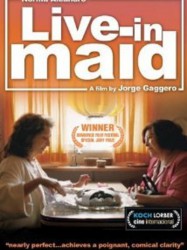
Cama adentro (2004)
, 1h23Genres Drame
Thèmes Politique
Acteurs Norma Aleandro, Hilda Bernard
Note69%





Beba used to be a well-to-do socialite but Argentina's economic crisis has left her with almost nothing. She is then forced to sell beauty products door-to-door.
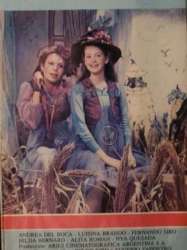
Días de ilusión (1980)
Réalisé par Fernando Ayala
Genres Drame, Fantasy
Acteurs Andrea Del Boca, Fernando Siro, Hilda Bernard
Note63%






La flor de la mafia (1974)
Genres Drame, Policier
Acteurs Federico Luppi, Rodolfo Ranni, Aldo Barbero, Susana Freyre, Hilda Bernard, Roberto Carnaghi
Rôle Señora Villasoro / Miss Villasoro
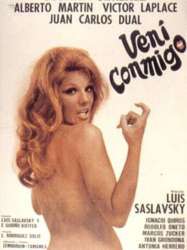
Vení conmigo (1973)
Réalisé par Luis Saslavsky
Genres Comédie
Acteurs Ignacio Quirós, Marcos Zucker, Antonia Herrero, Hilda Bernard, Hugo Fregonese
Note52%






Autocine mon amour (1972)
Réalisé par Fernando Siro
Genres Comédie
Acteurs Ulises Dumont, Fernando Siro, Nelly Beltrán, Mario Passano, Hilda Bernard

Enigma de mujer (1956)
, 1h20Acteurs Ana Mariscal, George Rigaud, José Cibrián, Hilda Bernard, Lautaro Murúa

Historia de una soga (1956)
Genres Drame, Policier
Acteurs Hilda Bernard, Mario Passano, Susana Campos, Amalia Sánchez Ariño
Rôle Soga (Voz)

Ils étaient cinq (1952)
, 1h29Réalisé par Claude Pinoteau, Jack Pinoteau
Origine France
Genres Drame, Comédie dramatique
Acteurs Louis de Funès, Jean Carmet, Jean Gaven, Michel Jourdan, Jean-Claude Pascal, Arlette Merry
Rôle (Non crédité)
Note66%





Jean, le postier - Marcel, le boxeur - Roger, l'acteur - André, l'étudiant et Philippe, le fils de bonne famille - cinq jeunes garçons inséparables compagnons de guerre, sont rendus à la vie civile et jurent de préserver leur amitié. Roger, sans emploi, retrouve sa sœur Valérie, chanteuse dans une boîte de nuit. Il est engagé par Frédo pour de louches besognes et devient l'amant de Simone, l'amie de Jean. Marcel qui va de défaite en défaite, rejoint l'équipe de Frédo. André pour racheter la conduite de son père pendant l'occupation se fera tuer en Indochine. Lors d'un coup, Marcel est tué. Valérie est abattue par un complice de Frédo et Roger est emprisonné. L'amitié pourra peut-être réunir encore Philippe, Jean et Roger à la libération de ce dernier.
 Connexion
Connexion

